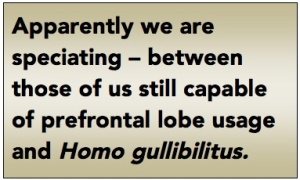A number of recent web-notables all seem to revolve (eccentrically) around the question of human evolution. Whether it continues. Whether there is such a thing as "selection in groups." Whether our technological (cyborg) augmentations and/or increasing numbers of "non-neuro-typical" society members portend a new splitting of human destiny. And it looks as if I should have set Existence just five years in the future, instead of 35!
 For starters, see a short futuristic film by Eran May-raz and Daniel Lazo about the "game-ification" of everything. They reveal a near future world very much like the one illustrated in my new novel, a very close tomorrow when you'll overlay reality with meta-information...
For starters, see a short futuristic film by Eran May-raz and Daniel Lazo about the "game-ification" of everything. They reveal a near future world very much like the one illustrated in my new novel, a very close tomorrow when you'll overlay reality with meta-information...
...only, instead of using it to solve problems or join "smart mobs" as I depict in a focused drama... some folks will apply such tech in different ways, turning every act, even cooking an egg, into an opportunity for "point-scoring." Both cool and kinda chilling, it's a thought-provoking little film. These challenges to human wisdom and coping ability will continue piling up.
Anodyne for Anecdotes: Need a counter-riff to volley back at your friends who gullibly send you forwarded nonsense via email or social media? Disinformation, rumors, assertions and "anecdotes" that are easily disproved? (One end of the American political spectrum now uses only assertions, allegories and anecdotes and has achieved the miracle of becoming nearly 100% fact free. The other political wing seems to be constantly toying with the temptation to follow suit -- heaven help us if/when they do!)
For a tonic, send your "FWD: emailers" this cogent essay, Dissing the Disinformation, about the ancient, gracious and adult art of fact-checking in this modern era. Will it accomplish anything? Yes! The idiots won't read it or learn anything or stop FWD-spamming their friends with nonsense. But they will take you off their "FWD: list."
 Apparently we are speciating, folks, between those of us still capable of prefrontal lobe usage and Homo gullibilitus.
Apparently we are speciating, folks, between those of us still capable of prefrontal lobe usage and Homo gullibilitus.
And if you believe that...
...see a fascinating - if challenging - discourse by the eminent scholar Steven Pinker about the fallacies of most notions of "group selection" in evolution theory. I don't agree with him on all counts, but it is a feast of clear thinking.
But nature follows many paths. One of the themes in Existence, explicitly stated by several characters, is the question of speedups in human evolution. It might be argued that one of these happened about 35,000 years ago, when suddenly Homo sapiens began drawing cave art, burying their dead and expanded their tool sets by more than ten-fold. I contend similar changes happened with the introduction of beer, and then towns, and the Renaissance-Enlightenment. My new novel attempts to explore this concept from many angles, both pro and con.
And it seems I am not the only one. In this TED talk, Will our kids be a different species? Juan Enriquez sweeps across time and space to bring us to the present moment — and shows how technology is revealing evidence that suggests rapid evolution may be under way.
Speaking of (sub) speciation: During the nine years it took for me to write Existence, I grew increasingly convinced that the phenomenon of "autistic spectrum" - ranging from deep autism to Aspergers to simply way-nerdy - would become ever-more significant in future years. Not only because the spectrum appears to be manifesting more often (some call it a "plague"), but also as technologies enable folks who were once isolated and victimized to connect with one another, form interest groups, alliances, pool resources and match skills. I portray this becoming a powerful force by the year 2050...
...and now it appears that others agree. Steve Silberman, a longtime contributing editor at Wired will soon be publishing a book, Neurotribes: Thinking Smarter About People Who Think Differently, which argues that non-neurotypicals will play an ever-growing role in society. See a fascinating article about this at io9: How Autism is changing the world for everyone. io9 is increasingly the go-to site for all things future and science-fictional.
=== Diverging Humanity: Olympics Edition! ===
 With the start of the Olympics, one may ask: Will Athletes ever stop breaking new records? Or will they continue to grow stronger, better, faster...as we approach the biomechanical limits of the human body. Niven and Barnes portrayed one possibility in Achilles' Choice... that beefed up and drug-accelerated and e-hypered athletes would be given their own, separate olympics in which they could burn themselves out achieving short lives but glorious ones.
With the start of the Olympics, one may ask: Will Athletes ever stop breaking new records? Or will they continue to grow stronger, better, faster...as we approach the biomechanical limits of the human body. Niven and Barnes portrayed one possibility in Achilles' Choice... that beefed up and drug-accelerated and e-hypered athletes would be given their own, separate olympics in which they could burn themselves out achieving short lives but glorious ones.
 In contrast, Daniel Wilson's Amped shows a near future wherein a frightened public over-reacts and legislates against those who get "amplified" with implants. What has already happened? The Special Olympics offers a venue for the disabled to show off how hard they have developed... "despite." Meanwhile, some regular folks are terrified of double amputees who are doing amazing things with those "sproing" legs. See Aimee Mullins in her amazing TED talk "My twelve sets of legs."
In contrast, Daniel Wilson's Amped shows a near future wherein a frightened public over-reacts and legislates against those who get "amplified" with implants. What has already happened? The Special Olympics offers a venue for the disabled to show off how hard they have developed... "despite." Meanwhile, some regular folks are terrified of double amputees who are doing amazing things with those "sproing" legs. See Aimee Mullins in her amazing TED talk "My twelve sets of legs."
My expectation? It will be a case of "all of the above." Arguments over where to draw the lines between these groups. But not much of a fight over whether there should be venues for all of them! Including... ironically, a new Olympics level that will return to the roots, and be severely drug-tested and rigorously vetted, so that it is only for... amateurs.
Very interesting... and scary: Can Neuroscience Cure Gaming's Gun Obsession? One researcher wants to use MRI machines to watch video game players and explore how developers can exploit the human brain’s dopamine pleasure-reward circuitry to hook players, and suggests that game developers would not want to light up the striatum constantly in some kind of sensory overload, but believes games could be developed to target players’ emotions with scientific accuracy. Read the article by Lee Hall.
=== Science potpourri ===
 Remember that scene in Minority Report when the spider robots stalk Tom Cruise to his apartment and scan his iris to identify him? Things could have turned out so much better for Cruise had he been wearing a pair of contact lenses embossed with an image of someone else’s iris. Reverse-engineered irises look so real, they fool eye-scanners. And no I never believed in iris scanning. There are so many more reliable bio markers.
Remember that scene in Minority Report when the spider robots stalk Tom Cruise to his apartment and scan his iris to identify him? Things could have turned out so much better for Cruise had he been wearing a pair of contact lenses embossed with an image of someone else’s iris. Reverse-engineered irises look so real, they fool eye-scanners. And no I never believed in iris scanning. There are so many more reliable bio markers.
Activities that we are engaged in for the first few minutes after learning new information really affect how well we remember this information after a week. Maybe all you really need to do to cement new learning is to sit and close your eyes for a few minutes.
Researchers from UCLA and California NanoSystems Institute have developed a new transparent solar cell, giving windows in homes and other buildings the ability to generate electricity. This new kind of polymer solar cell (PSC) produces energy by absorbing more near-infrared light but is less sensitive to visible light, making the cells nearly 70% transparent to the human eye.
Aerographite: world's lightest material 75 times lighter than styrofoam. Electrical conductor also.
Ford's new 3-cylinder EcoBurst Engine could challenge hybrids.
=== And Finally ... ===
 Supplement ANY of your classes with videos from Khan Academy... see this. Seriously guys, it's free and cool and with-it...and potentially uplifting.
Supplement ANY of your classes with videos from Khan Academy... see this. Seriously guys, it's free and cool and with-it...and potentially uplifting.
Philosophical ponderings of the nature of time... made funny.




Comments